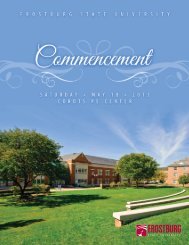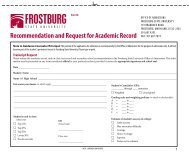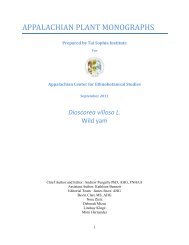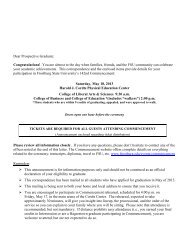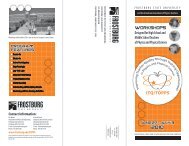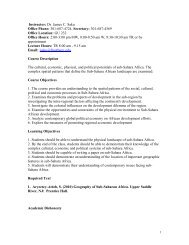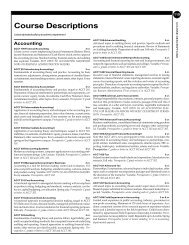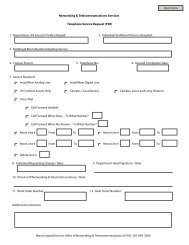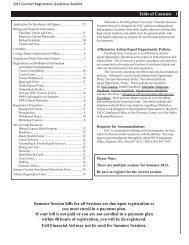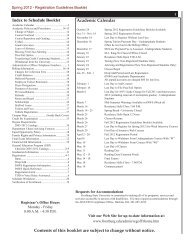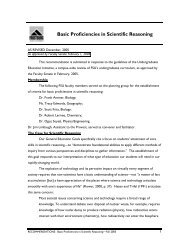Spring 2012 - Frostburg State University
Spring 2012 - Frostburg State University
Spring 2012 - Frostburg State University
You also want an ePaper? Increase the reach of your titles
YUMPU automatically turns print PDFs into web optimized ePapers that Google loves.
18<br />
An important component of CHILL<br />
has been twice-yearly biometric<br />
screenings offered free to students.<br />
Students are weighed, have their<br />
blood pressure checked and are<br />
given fasting blood tests to check for highdensity<br />
lipoprotein (HDL) and low-density<br />
lipoprotein (LDL) cholesterol levels, triglycerides<br />
and glucose. While these screenings<br />
were designed to evaluate individual students’<br />
health and offer follow-up care and guidance<br />
as needed, a secondary benefit has been to<br />
amass a large pool of baseline health data for<br />
a population that is rarely screened for these<br />
issues, according to April Baer, coordinator<br />
for <strong>University</strong> Wellness at <strong>Frostburg</strong> <strong>State</strong><br />
<strong>University</strong> who heads up CHILL.<br />
“The landscape for wellness for young<br />
adults is not where we thought it was,” said<br />
Baer.<br />
Based on nearly 1,200 unduplicated firsttime<br />
screenings of students between the ages<br />
of 18 and 24, nearly 68 percent showed at<br />
least one health concern – elevated blood<br />
pressure, glucose levels or body mass index<br />
or poor cholesterol or triglyceride readings.<br />
Nearly 32 percent of those young adults<br />
screened had more than one abnormal reading.<br />
Among them:<br />
51 percent were for low levels of HDL<br />
cholesterol (less than 40/50),<br />
41 percent were for elevated blood pressure<br />
(above 120/80),<br />
24 percent were for elevated body-mass<br />
index and body composition,<br />
9 percent were for overall cholesterol (200<br />
or above),<br />
2 percent were for high levels of LDL<br />
cholesterol (130 or above),<br />
Black-garbed students fill the stands at a soccer game this fall at one of the CHILL CHOICES Blackout Games.<br />
2 percent were for high triglyceride levels<br />
(150 or above) and<br />
2 percent were for elevated glucose.<br />
“These results were very surprising in such<br />
a young population,” Baer said. “This really<br />
challenges assumptions that are made about<br />
the care of cardiovascular disease and how<br />
early these characteristics appear. This doesn’t<br />
happen overnight.”<br />
The screenings were open to all students,<br />
although those with pre-existing conditions<br />
were screened separately through the campus’<br />
Brady Health Center. First-year students<br />
were encouraged to go through Introduction<br />
to Higher Education, an orientation course<br />
required of all freshmen, and many athletes<br />
were urged into testing by their coaches, Baer<br />
said. Everyone who came to the mass screenings<br />
received breakfast and a CHILL T-shirt,<br />
and the opportunity to win prizes, such as<br />
hoodies or flash drives.<br />
Those students who had abnormal lab<br />
results were contacted and given the opportunity<br />
to meet with a registered nurse or dietician<br />
through FSU’s Brady Health Center.<br />
The good news is that with intervention, a<br />
number of students who showed significant<br />
cardiovascular health risks – many who likely<br />
would have not been diagnosed for years<br />
– were able to receive treatment and make<br />
lifestyle changes that had a positive impact on<br />
their health. (See page 21.)<br />
As of spring 2011, a total of 1,650 screenings<br />
has been performed. These include the<br />
1,200 first-time screenings of students ages 18<br />
to 24, along with students who were screened<br />
more than once, who are older than 24 or<br />
who had a pre-existing condition. An additional<br />
300 students were screened by the end<br />
of 2011, but their results haven’t yet been<br />
incorporated into the total.<br />
Residents of the bWell wellness-themed residence<br />
hall learn “The Dougie” in a dance program.<br />
Since large-scale biometric screenings<br />
of this age population are unusual, FSU’s<br />
results point to the need for a larger effort in<br />
identifying young people with early indicators<br />
of cardiovascular issues, Baer said.<br />
baseD in sCienCe,<br />
baseD in wellness<br />
CHILL was established in 2008 as a science-<br />
and wellness-centered initiative to<br />
promote health practices and education<br />
among students and the local community,<br />
thanks to an initial $228,225 contribution<br />
from AstraZeneca. Four years later, total<br />
contributions from AstraZeneca have topped<br />
$912,000, and CHILL has become an<br />
increasingly integral part of life at FSU.<br />
Among CHILL’s primary components:<br />
For its first three years, CHILL sponsored<br />
a yearly “Biggest Loser”-style competition,<br />
in which teams earn points not through<br />
weight loss, but through documenting health<br />
practices such as keeping workout and food<br />
logs and by participating in the numerous<br />
wellness education programs that are offered.<br />
Even though it is not a weight-loss competition,<br />
participants lost a total of 198 pounds<br />
in the first two years it has was offered. That<br />
program has now been refocused into Bobcats<br />
for Better Health, an eight-week program<br />
working with Julia Miller, a nurse in the<br />
Brady Health Center who was hired through<br />
CHILL, offering similar services and rewards<br />
for the participants.<br />
In the fall of 2010, the first wellnessthemed<br />
on-campus living environment,<br />
bWell, was established, housing students on<br />
the top floor of Cumberland Hall. This academic<br />
year, bWell has taken over all of Allen<br />
Hall, providing mostly first-year students<br />
with a cohort of supportive fellow travelers in<br />
their desire to be healthy. Overall, the goal is<br />
to get the freshmen off to a healthy start, both<br />
physically and in their bond with the campus.<br />
Peer mentor Ben Bolyard, a junior business<br />
major, encourages his charges to take advantage<br />
of information sessions and CHILL<br />
activities, incorporate activity into their lives<br />
or organize pickup games of football, volleyball,<br />
basketball or wiffle ball. His efforts range<br />
from the formal, such as organizing presentations,<br />
to the informal, such as giving a gentle<br />
“nudge” to a freshman who was too fond of<br />
cookies. “He’s been cookie-free for two weeks<br />
now,” Bolyard said.<br />
The <strong>University</strong> has made institutional<br />
changes to make healthy options more available<br />
to students, including renovating the<br />
Cordts Physical Education Center fitness center<br />
and building a cardio-focused fitness center<br />
in the renovation of the Lane <strong>University</strong><br />
Center. The latter center has been named<br />
the AstraZeneca Fitness Center in appreciation<br />
for AstraZeneca’s support of the CHILL<br />
initiative and in recognition of Tony Zook<br />
’82, executive vice president of AstraZeneca’s<br />
Global Commercial organization.<br />
On-campus food service provided by<br />
ARAMARK has increased its healthy options<br />
and has been promoting nutritional information<br />
more intently, Baer said. In addition,<br />
some positions related to CHILL that had<br />
been funded by grants and contributions<br />
have been incorporated into the <strong>University</strong>’s<br />
budget. Most recently, FSU became a smokefree<br />
campus in August, barring smoking from<br />
all indoor and outdoor campus spaces, and<br />
offering smoking cessation assistance to those<br />
who need it.<br />
broaDening the mission<br />
In its third and fourth years, CHILL has<br />
broadened its sights to add binge-drinking<br />
reduction, sexual health and smoking cessation<br />
to its model of college health.<br />
FSU has begun receiving recognition for<br />
the efforts to enhance wellness among its<br />
students, as well as among faculty and staff.<br />
The <strong>University</strong> was designated a “Gold Start!<br />
Fit-Friendly Company” by the American<br />
Heart Association and Start! four years run-<br />
The Junkyard Run featured teams running<br />
and jumping on and over junked cars, a CHILL<br />
CHOICES program that also presented information<br />
encouraging students to choose low- or no-risk<br />
drinking practices.<br />
sCreenings revealeD:<br />
68 % of screened students had at least one<br />
health concern<br />
32% had more than one abnormal reading<br />
51 % - low levels of HDL<br />
41 % - elevated blood pressure<br />
24 % - elevated body-mass index & body comp.<br />
9 % - overall cholesterol<br />
2 % - high levels of LDL<br />
2 % - high triglyceride levels<br />
2 % - elevated glucose<br />
19




